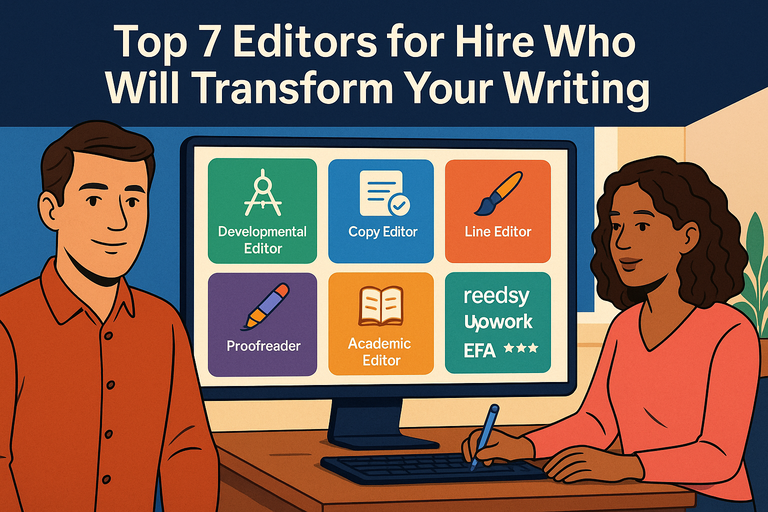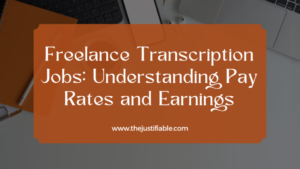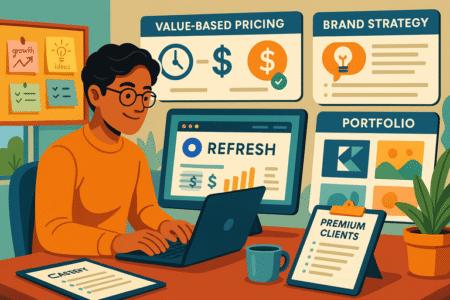Table of Contents
Editors for hire can make the difference between writing that feels flat and writing that truly connects with readers. Have you ever wondered what happens when your draft is polished by someone with a sharp eye for detail, style, and flow?
In this guide, we’ll explore seven exceptional types of editors you can hire and how each one can transform your words into something that feels professional, engaging, and memorable.
1. Developmental Editors Who Shape Big Ideas
When your draft feels messy or overwhelming, developmental editors step in to help untangle the bigger picture.
They don’t just correct sentences—they guide the direction of your work, making sure your structure, flow, and message actually land with readers.
Understand How Developmental Editors Refine Structure
Think of a developmental editor as an architect. If you bring them a pile of bricks (your first draft), they’ll show you how to build a house that stands tall instead of wobbling.
They look at chapter order, pacing, character arcs, or argument flow—depending on whether you’re writing a novel, memoir, or nonfiction book.
Here’s how they refine structure in practice:
- They’ll check if your beginning hooks the reader.
- They’ll analyze whether your middle sections drag or lose focus.
- They’ll help tighten endings so your message lands.
In my experience, writers often get lost in details too soon. A developmental editor keeps you zoomed out so you don’t polish a sentence in a chapter that might get cut anyway.
Why Vision And Storytelling Strength Matter At This Stage
You can have perfect grammar and still end up with a book that no one wants to finish. This stage is about vision: The big “why” behind your project. A good developmental editor asks tough questions—Why does this story matter? What’s missing? Where’s the emotional heartbeat?
I once worked with a writer who had a brilliant premise but buried it under 80,000 words of tangents. Their developmental editor identified the core message and helped cut 25% of the manuscript, which suddenly made the story shine. That’s the storytelling strength they bring: clarity and focus.
If you’re aiming for publishing success—whether through traditional publishers or self-publishing—this step is non-negotiable. Skipping developmental editing is like building a skyscraper without checking the foundation.
How To Find A Developmental Editor With The Right Expertise
Not all editors are created equal. If you’re writing fantasy, you need someone who understands world-building. If you’re working on a research-heavy nonfiction book, you need someone who can balance depth with readability.
Here’s how I suggest you find one:
- Browse professional directories like Editorial Freelancers Association (EFA).
- Check their portfolio for projects similar to yours.
- Request a sample edit—many editors will edit 5–10 pages so you can see their style.
Pro tip: Don’t just choose the cheapest option. Developmental editing can run from $0.03 to $0.08 per word, but the right editor can save you months (or years) of frustration.
2. Copy Editors Who Perfect Grammar And Flow
Once your structure is solid, it’s time for a copy editor to zoom in on the sentence level. They fine-tune grammar, word choice, and rhythm so your work feels clean and professional without losing your unique voice.
Common Writing Issues Copy Editors Eliminate
Copy editors are like the quiet superheroes of publishing. Here are the mistakes they usually sweep away:
- Grammar slip-ups: misplaced commas, subject-verb agreement, dangling modifiers.
- Style inconsistencies: switching between “color” and “colour,” or “%” and “percent.”
- Overused words: “just,” “really,” “very”—words that water down your writing.
- Awkward sentences that trip readers up.
One time, I thought my article was spotless. My copy editor found three comma splices in the first two paragraphs alone. That’s the level of detail you can expect.
How Copy Editing Improves Readability And Clarity
Copy editing isn’t just about nitpicking rules. It’s about making your work easy to read without dumbing it down.
For example:
- A copy editor will shorten bloated sentences.
- They’ll suggest stronger verbs to replace weak filler words.
- They’ll flag jargon and either define it or recommend a simpler phrase.
This makes a huge difference if you’re writing blog posts, articles, or marketing copy where clarity and engagement are everything. Readers don’t notice good copy editing—it just feels smooth. They only notice when it’s missing.
I believe copy editing is what transforms “good writing” into “professional writing.” It’s the stage where your voice shines without being muffled by clunky language.
Where To Look For Skilled Copy Editors Online
If you’re ready to hire, there are reliable places to start:
- Upwork and Fiverr Pro: Good for freelance copy editors with reviews and portfolios.
- Reedsy: Specializes in book editors with publishing experience.
- Editorial Freelancers Association (EFA): A professional directory where you can filter by skill and genre.
When you post a job, be clear about what you need. Say whether you want heavy edits (substantial rewriting) or a light polish. Ask about turnaround time and availability—experienced editors often book up months in advance.
From what I’ve seen, investing in a skilled copy editor is one of the most cost-effective decisions a writer can make. Your credibility is on the line, and nothing turns readers away faster than sloppy writing.
3. Line Editors Who Elevate Style And Tone
If developmental editors look at the blueprint and copy editors check grammar, line editors are the ones who polish the actual experience of reading your work.
They zoom in on sentences and paragraphs to make sure your style is sharp, your tone is consistent, and your words feel alive.
The Difference Between Line Editing And Copy Editing
People often confuse line editing with copy editing, but they’re not the same. Copy editors deal with rules—grammar, spelling, punctuation. Line editors deal with music—the rhythm, flow, and emotional impact of your words.
Imagine this sentence:
- Draft: “She quickly ran down the street, really wanting to get there before it was too late.”
- Copy edit: Fixes “quickly ran” to “ran quickly,” and ensures commas are correct.
- Line edit: Suggests: “She sprinted down the street, desperate to arrive before time slipped away.”
See the difference? The line edit makes it sharper, stronger, more emotionally engaging. That’s their superpower.
How Line Editors Bring Consistency To Your Voice
A lot of writers struggle with voice. Maybe you start your book witty and casual, but by chapter six, you’ve drifted into academic formality. Line editors notice that shift and bring you back on track.
Here’s what they typically adjust:
- Sentence rhythm: cutting long, dragging lines into punchier ones.
- Word choice: swapping bland verbs for precise, powerful ones.
- Tone consistency: ensuring your voice doesn’t sound like two different people wrote it.
In one project I saw, the writer alternated between modern slang and stiff textbook language. The line editor balanced it out, keeping the casual tone while smoothing the rough edges. The result? A book that actually sounded like the writer, only better.
Key Questions To Ask Before Hiring A Line Editor
Hiring a line editor is personal because they’ll shape the way your writing feels. Before committing, I suggest asking:
- Can you show me before-and-after samples of your work?
- Do you specialize in my genre (fiction, nonfiction, marketing, etc.)?
- How do you balance polishing my voice without rewriting it into yours?
- What software do you work in (Word with Track Changes, Google Docs, Scrivener)?
A good line editor won’t just fix sentences—they’ll explain why they changed something, so you learn in the process. The best ones feel like collaborators, not dictators.
4. Proofreaders Who Deliver Error-Free Writing
Proofreaders are the safety net at the end of the editing journey. They’re the last pair of eyes before you hit publish, ensuring your manuscript, blog post, or sales page is completely error-free.
Why Proofreading Is The Essential Final Step
Skipping proofreading is like walking onto stage with spinach in your teeth. Even if your structure and style are perfect, one typo can ruin the impression.
Proofreading checks things no other editing stage guarantees:
- Typos and spelling errors.
- Extra spaces or repeated words.
- Consistency in formatting (page numbers, headers, captions).
- Final grammar or punctuation slip-ups.
I’ve seen professional writers publish ebooks only to get reviews that complain about basic mistakes. Readers are unforgiving—one silly typo can sink your credibility. That’s why proofreading is always the essential last step.
How Proofreaders Catch Mistakes You Overlook
Our brains are sneaky. When you read your own work, your eyes skim over mistakes because you know what you meant to say. Proofreaders, on the other hand, read with fresh eyes and zero bias.
They’ll catch errors like:
- “their” vs. “there” mix-ups.
- Missing periods at the end of dialogue.
- Inconsistent capitalization (e.g., “Internet” vs. “internet”).
A simple example: I once thought I sent out a flawless client proposal. The proofreader caught that I’d written “pubic relations” instead of “public relations.” That one letter could have cost me the gig. Proofreaders save you from those embarrassments.
Affordable Options For Hiring Professional Proofreaders
Proofreading doesn’t have to drain your wallet. Here are practical routes:
- Freelance sites (Fiverr, Upwork): You’ll find affordable proofreaders who can deliver quick turnarounds for shorter projects.
- Professional directories (EFA, ACES): Higher-priced but often more reliable for books and academic work.
- AI-assisted proofreading (Grammarly, ProWritingAid): Great for catching small mistakes, but still worth combining with a human proofreader for important projects.
If budget is tight, I suggest doing a self-edit with a tool like Grammarly first, then paying a proofreader for a final pass. That way you cut down their workload and lower the cost.
Quick Comparison Table: Editors vs. Proofreaders
| Role | Focus | Best For | Example Fixes |
| Developmental Editor | Big picture, structure, flow | Books, long-form projects | Cuts weak chapters, strengthens story arc |
| Copy Editor | Grammar, clarity, consistency | Articles, blog posts, professional writing | Fixes grammar, improves readability |
| Line Editor | Style, tone, rhythm | Creative work, personal voice-driven writing | Reworks sentences for impact |
| Proofreader | Surface-level errors | Final polish for all types of content | Typos, punctuation, formatting |
5. Technical Editors Who Simplify Complex Content
Technical editors are the bridge between experts and everyday readers. They take dense, jargon-heavy material and make it clear without losing precision.
If you’ve ever read a manual or industry white paper that actually made sense, chances are a technical editor worked behind the scenes.
How Technical Editors Make Industry Jargon Accessible
Jargon is one of the fastest ways to lose your audience. A technical editor translates complex terminology into something readers can understand, while still keeping it accurate.
Example: Instead of “utilize a multi-factor authentication protocol,” a technical editor might suggest “set up two-step verification.” The meaning stays intact, but the barrier for readers disappears.
From what I’ve seen, they use tools like Microsoft Word’s Track Changes or Google Docs Suggesting Mode to highlight where sentences get overly complex. They might even insert comments like, “Can we rephrase this for a non-technical audience?” That feedback is invaluable.
Why Accuracy And Clarity Are Crucial In Technical Editing
Technical documents often deal with critical topics—think medicine, engineering, software instructions. One unclear phrase could cause serious mistakes. A technical editor ensures:
- Terms are used consistently.
- Instructions follow a logical order.
- Data and figures are double-checked for accuracy.
I worked with a startup once where the technical editor caught a mislabeled chart in a user manual. If left unchecked, customers would have connected wires incorrectly. That’s how crucial this role can be.
Top Platforms To Hire Reliable Technical Editors
If you’re searching for a technical editor, look where professionals gather:
- Society for Technical Communication (STC): A directory dedicated to technical communicators.
- Upwork with specialized filters: You can filter for editors with IT, medical, or engineering backgrounds.
- Reedsy for nonfiction and guides: Good for technical but reader-friendly books.
Pro tip: Ask if they’ve worked in your specific field before. A technical editor with software experience may not be the best fit for medical documents.
6. Academic Editors Who Strengthen Research Papers
Academic editors know how to make research sound credible, clear, and properly formatted. They’re especially valuable if you’re submitting to journals, writing a dissertation, or preparing a thesis.
How Academic Editors Ensure Precision And Formatting
Academic writing is judged on precision. An academic editor will:
- Fix grammar and sentence structure without altering meaning.
- Ensure citations follow the correct style (APA, MLA, Chicago).
- Format tables, figures, and references consistently.
One PhD student I knew swore her dissertation was ready—until her academic editor flagged mismatched citation styles across chapters. That kind of detail can make or break approval.
The Role Of Academic Editors In Meeting Publication Standards
Every journal has strict standards, and editors help you meet them. They understand how peer reviewers think and what can get your paper rejected. Their role often includes:
- Checking for plagiarism risks.
- Making sure arguments are logical and well-supported.
- Adjusting tone to be formal but still readable.
I suggest working with an academic editor early in the process. It saves headaches later when your submission gets bounced back for technicalities.
Services That Specialize In Academic Editing Support
Reliable academic editing isn’t hard to find if you know where to look:
- Editage: Popular with researchers for journal-focused editing.
- Cambridge Proofreading & Editing: Known for handling academic manuscripts.
- University-affiliated services: Some colleges offer editing services through writing centers or graduate networks.
If budget is tight, pairing Grammarly for early clean-up with a human academic editor at the end can help keep costs manageable.
7. Freelance Editors Who Offer Flexible Expertise
Freelance editors are versatile—they work across genres and project types, offering more flexibility than agencies or publishing houses. If you want one-on-one collaboration, freelancers can often give you that personal attention.
Benefits Of Choosing Freelance Editors Over Agencies
Agencies can feel rigid, while freelancers tend to adapt to your schedule and style. Benefits include:
- Direct communication—no middlemen.
- Flexible pricing—hourly, per word, or per project.
- Personalized feedback tailored to your voice.
I believe freelance editors are ideal for smaller projects like blog posts, short ebooks, or business copy where speed and budget flexibility matter.
How To Match A Freelance Editor To Your Writing Needs
Finding the right freelance editor is about fit, not just skill. Here’s how to match one:
- Look at their niche. Do they specialize in fiction, nonfiction, or marketing?
- Ask for a short trial edit (even 1,000 words can show their style).
- Clarify scope—are you expecting developmental input, or just proofreading?
I recommend writing a clear job brief: “I need line editing for a 40,000-word fantasy novel” gets better results than “I need editing.”
Trusted Websites To Find Experienced Freelance Editors
Here are a few proven places to connect with professionals:
- Reedsy: Great for books, with editors who’ve worked at major publishing houses.
- Upwork and Fiverr Pro: Offer a wide pool of freelance editors with reviews and portfolios.
- EFA (Editorial Freelancers Association): A vetted directory for serious professionals.
If you’re new to hiring editors, I suggest starting with a smaller project first. That way you can see if their style fits before committing to a large manuscript.
Expert Tip For Hiring The Right Editor
Always request a sample edit before making your decision. This simple step tells you more than any resume ever could. You’ll see how they handle your voice, whether they over-edit, and how their communication style matches yours.
In my experience, the best editor is not just skilled—it’s someone you feel comfortable collaborating with.






